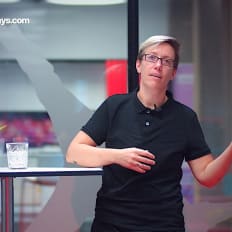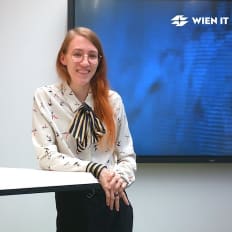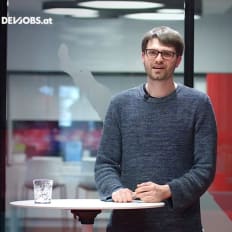
WienIT
Florence Adegeye, Service Owner bei WienIT
Description
Service Owner bei WienIT Florence Adegeye gibt im Interview Einblicke in den Aufbau der Teams, worauf beim Recruiting der Fokus liegt und welche Technologien im Unternehmen Einsatz finden.
By playing the video, you agree to data transfer to YouTube and acknowledge the privacy policy.
Video Summary
In the talk 'Florence Adegeye, Service Owner bei WienIT,' Florence Adegeye outlines the CMS Services team, which implements content management systems for the Wiener Stadtwerke group, and a service-oriented setup with roles including developers, business consultants, testers, and content managers to bring in the customer perspective. Teamwork is central; candidates meet the whole team from the start and are closely supported during onboarding across technical, organizational, and team aspects. The tech stack at WienIT is broad; her team uses Java, JavaScript, Angular, and newer technologies such as Kubernetes.
Teamwork, a Broad Tech Stack, and Service Orientation: Inside WienIT’s CMS Services with Florence Adegeye
Context: Our takeaways from “Florence Adegeye, Service Owner bei WienIT”
In the session titled “Florence Adegeye, Service Owner bei WienIT,” the Service Owner of the CMS Services team offers a concise tour of her mandate, team structure, and way of working. From our DevJobs.at editorial seat, a clear picture emerges: this is about delivering Content Management Systems (CMS) for the Wiener Stadtwerkegruppe, operating in a service-oriented model, collaborating across multiple roles—and building on a tech stack that spans Java, JavaScript, Angular, and Kubernetes. Above all, it is about something Florence places front and center:
“The most important thing in my team is teamwork.”
That emphasis threads through everything she shares—from hiring to onboarding to the daily collaboration between developers, business consultants, testers, and content managers.
Mission: CMS services for the Wiener Stadtwerkegruppe
Florence frames her area of responsibility succinctly: she is the Service Owner for CMS Services, implementing the Content Management Systems for the Wiener Stadtwerkegruppe. That sets a concrete mission: to deliver and run CMS solutions for a major internal customer group. It’s not technology for its own sake; it is a sustained service commitment.
- Goal: Working CMS solutions aligned with the needs of the Wiener Stadtwerkegruppe.
- Focus: Implementation and ongoing service—not just a one-off delivery.
- Impact: A team that bridges technology and content so the systems are genuinely usable.
“We implement the Content Management Systems of the Wiener Stadtwerkegruppe” is a statement that turns mission into accountability: the team builds with direct regard to real use, real content, and real stakeholders.
Service orientation as a working principle
“As with all other service teams, we work in a service-oriented way.” With that, Florence defines the team’s compass. Service orientation means understanding needs, managing expectations, and owning outcomes—collectively.
What does that translate to in practice?
- Outcome over silos: Value and impact matter more than isolated deliverables.
- Continuity over one-off handovers: CMS as a service means ongoing care and iteration.
- Customer proximity as a quality metric: Decisions are measured by how they help the Wiener Stadtwerkegruppe.
The result is a context in which technical excellence is inseparable from service quality. For engineers, it’s a strong learning ground: designing technology choices with sustained service in mind.
A multidisciplinary team: Developers, business consultants, testers—and content managers to inject the customer perspective
Florence describes a deliberately broad team composition:
- Developers
- Business consultants
- Testers
- Content managers
Her explicit mention of content managers—“to bring in the customer perspective”—is telling. In CMS work, projects rarely falter on pure technology alone; they falter when editorial workflows, content objectives, and usability are disconnected from technical decisions. By embedding content managers in the service team, usability, editorial logic, and content quality sit alongside architecture and implementation.
What this enables in collaboration:
- Requirements are framed in real editorial and publishing scenarios, not just abstract capability statements.
- Testing covers technical correctness and everyday usability for content teams.
- Developers receive immediate input from content practice, evaluating options with an eye on editorial experience.
The message is clear: the team operates across disciplinary lines because the service mandate demands it.
Teamwork as a core value
When Florence says “All roles work together and everyone can contribute,” she is setting the bar for how the team functions. Teamwork means shared responsibility, open knowledge, and decisions made together.
“All roles work together and everyone can contribute.”
How this comes to life:
- Shared ownership: Quality and service success are team outcomes, not individual trophies.
- Open contribution: Every role actively shapes solutions, beyond narrow job boxes.
- Continuous cooperation: Because CMS is provided as a service, long-term collaboration becomes the norm.
For tech talent that wants to have tangible impact while collaborating with adjacent disciplines, this is a compelling setup.
Hiring: Meet the team from the start
Florence’s point about applications is a strong signal:
“When you apply with us, you get to know everyone right from the start. That means it’s not just me—it’s also someone from my team.”
Candidates don’t just meet leadership—they meet the living team. This pays off in multiple ways:
- Fit through real dialogue: Candidates see firsthand how the team thinks and works.
- Transparency builds trust: The roles and their interplay are visible from the outset.
- Mutual choice: The team meets the candidate—and the candidate can evaluate the collaboration.
From our DevJobs.at perspective, this early team exposure is a mark of quality. It fosters realistic expectations and paves the way for durable cooperation.
Onboarding: Guided from day one—professionally, organizationally, and within the team
Florence is explicit about what matters to her when someone joins:
“It is important to me that from day one you are accompanied—professionally, organizationally, and above all within the team.”
Those three layers make onboarding stick:
- Professional: Technologies, tools, codebase, CMS configurations—structured ramp-up.
- Organizational: Processes, routines, responsibilities—the framework in which service is delivered.
- Team: Relationships, communication paths, feedback—the basis of collaboration.
Onboarding framed as accompaniment signals accountability to new colleagues—learning and arriving are treated as a team effort.
The tech stack: Breadth across frontend and backend—Java, JavaScript, Angular, and Kubernetes
“At WienIT we use a very broad tech stack, both in frontend and backend.” For Florence’s team specifically: Java, JavaScript, and Angular—alongside “new technologies such as Kubernetes.”
What this means for engineers:
- Breadth equals learning curve: Those who like to think across backend and frontend will find room to grow.
- Java, JavaScript, Angular: A combination fit for robust backends, dynamic frontends, and performant web apps.
- Kubernetes: A modern foundation for operations and scalability—aligned with a service that runs continuously.
The reference to “new technologies” alongside Kubernetes is a signal of openness: the team keeps its stack current and chooses tools that serve the service.
Why WienIT�’s CMS Services appeal to tech talent
From Florence’s account, reasons to consider joining are clear—especially for people who want to link service quality with engineering depth:
- Customer proximity that matters: Building CMS for the Wiener Stadtwerkegruppe leads to tangible outcomes.
- Multidisciplinary environment: Developers, business consultants, testers, and content managers collaborate by design.
- A team culture with substance: Teamwork is not a slogan—it’s visible in hiring, palpable in onboarding, and lived day to day.
- Technical breadth: Java, JavaScript, Angular, and Kubernetes provide room to grow across the stack.
- Service orientation: Technical excellence is measured by usability and operational success.
For many engineers, that blend is decisive: meaningful work, a cohesive team, and technologies that challenge and develop you.
Collaboration in practice: How roles translate into outcomes
Even without enumerating specific processes, the logic of collaboration is evident from Florence’s description. The roles and the service model create a pragmatic flow:
- Understanding needs: Business consultants and content managers bring in domain framing and the editorial perspective.
- Designing solutions: Developers shape architecture, interfaces, and frontend logic—with usability in view.
- Ensuring quality: Testers validate not only functionality but also everyday fitness for content work.
- Thinking about operations: Kubernetes points to a robust path for running the services.
The point is shared responsibility: from idea to actual use in the CMS, accountability is collective.
Signals for candidates—what to bring
Florence doesn’t list a checklist, yet several expectations are implied:
- Appetite for teamwork: Autonomy is welcome, isolation is not.
- Openness to interdisciplinarity: Collaboration with business and content is part of the job, not a side quest.
- Comfort with breadth: Java, JavaScript, Angular, and working in Kubernetes environments suit generalist-minded engineers.
- A service lens: Align decisions to the needs of the Wiener Stadtwerkegruppe—from code to editorial usability.
If these signals resonate, you’ll likely feel at home in WienIT’s CMS Services.
Session reference
- Title: “Florence Adegeye, Service Owner bei WienIT”
- Speaker: Florence Adegeye
- Company: WienIT
These are the anchors of the session we’re reflecting on—concise, focused, and clear in what matters.
Quotes and core messages that stick
A few lines capture the team’s culture succinctly:
“The most important thing in my team is teamwork.”
“When you apply with us, you get to know everyone right from the start.”
“It matters to me that from day one you are accompanied—professionally, organizationally, and especially within the team.”
Add to that the concrete context: CMS services for the Wiener Stadtwerkegruppe, a service-oriented way of working, and a stack that includes Java, JavaScript, Angular, and Kubernetes.
Who will thrive here
- Software engineers who don’t just ship features but think in terms of service, operations, and usability.
- Frontend and full-stack profiles who value Angular and bring backend fundamentals with Java.
- Engineers eager to deepen their experience in Kubernetes-centered environments.
- Technologists who enjoy proximity to business and content—and who view the customer/editorial perspective as a quality benchmark.
If that sounds like you, WienIT’s CMS Services offer a context that challenges and supports you—anchored in a clear service mission.
Conclusion: Service orientation as a quality promise—and a learning arena
“Florence Adegeye, Service Owner bei WienIT” shows how to organize an engineering team so that service quality, team culture, and technology development reinforce each other. The formula is straightforward yet demanding:
- Make the mission tangible (CMS for the Wiener Stadtwerkegruppe).
- Bring the right roles to the same table (development, business, testing, content).
- Practice teamwork as a daily habit.
- Design hiring and onboarding around encounter and guidance.
- Keep the stack broad and forward-looking (Java, JavaScript, Angular, Kubernetes).
For WienIT’s employer brand, this is a strong signal. For tech talent, it’s orientation: if you want to work with purpose, enjoy a cohesive team, and value a modern toolset, take a closer look. As Florence’s emphasis makes clear, teamwork comes first—and everything else falls into place around it.
More Dev Stories
WienIT Paula Gludovatz, Scrummie bei WienIT
Paula Gludovatz von WienIT erzählt im Interview über ihren Werdegang bis hin zur aktuellen Arbeit mit Scrum und was hier für Neueinsteiger wesentlich ist.
Watch nowWienIT Michelle Hackl, Lead Data Engineer bei WienIT
Michelle Hackl von WienIT gibt im Interview einen Einblick in ihren beruflichen Background, wie der Arbeitsalltag als Lead Data Engineer aussieht und welche Skills es für den Einstieg in eine Techlead Rolle braucht.
Watch nowWienIT Max Ehlmaier, Full Stack Developer bei WienIT
Max Ehlmaier von WienIT beschreibt im Interview wie er zum Full Stack Development gekommen ist, mit welchen Aufgaben er in seiner Arbeit zu tun hat und gibt Tipps für Einsteiger.
Watch now



